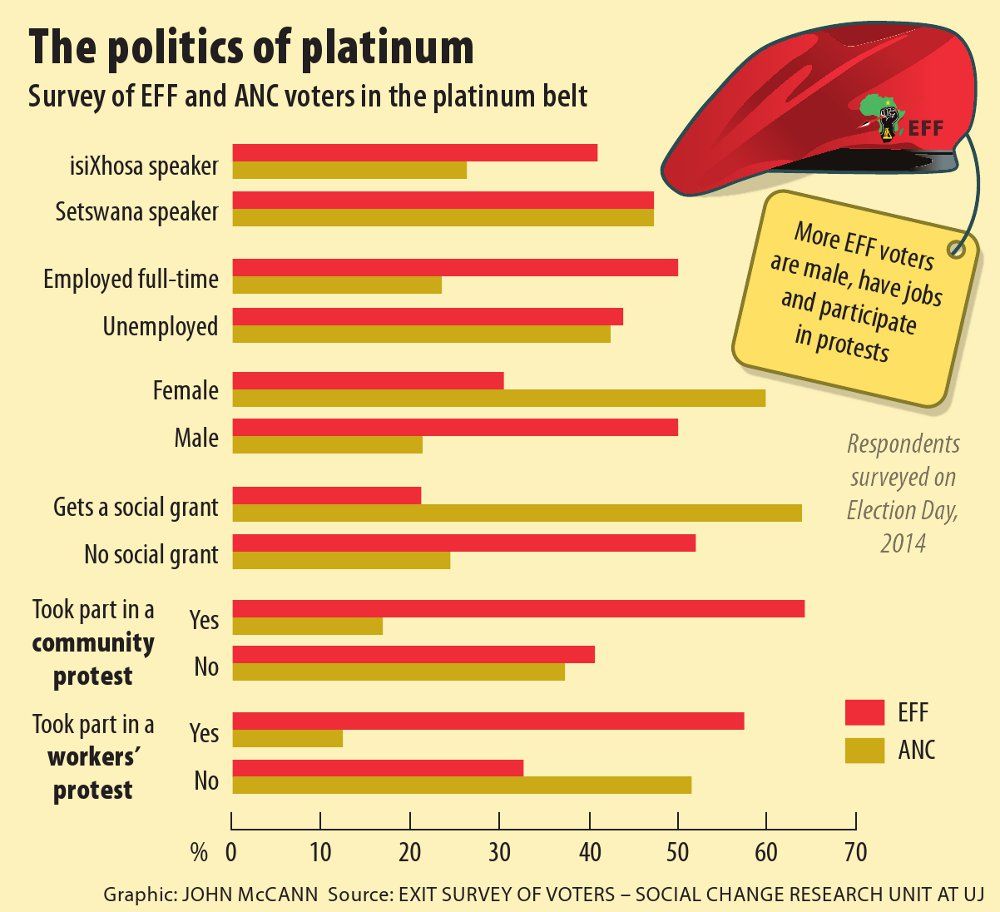At the EFF's final rally
NEWS ANALYSIS
In the 2009 national election, the ANC secured nearly three-quarters of the vote in the Rustenburg municipality. This year the ruling party managed only 57%.
The major beneficiary of ANC decline was the new kid on the block – the Economic Freedom Fighters – which achieved 20% of the vote despite being less than a year old.
A key moment in this political shift was the 2012 strike at Lonmin platinum mine in Marikana, during which 34 mine workers were gunned down by police.
The Marikana massacre brought to the fore the close relationship between the government, the mining companies, and trade unions – most notably the National Union of Mineworkers (NUM) and its labour federation, the Congress of South African Trade Unions (Cosatu).
For many residents of the platinum belt, the ANC is the glue that holds this triangle together. One mineworker put it that “the ANC is Cosatu. Cosatu is NUM. All those people; they have got a hand in the killing of workers who died at the mountain. Because they are the ones who called government and said we must be killed.”
Another simply concluded that he was voting EFF because “it did not kill us like the ANC”.
Malema makes a name for himself
Even before his rise to commander-in-chief of the EFF, Julius Malema was making a name for himself in the platinum belt.
He received a warm welcome from striking workers at Impala Platinum in February 2012, and his expulsion from the ANC stemmed at least partially from his persistent calls to nationalise the mines.
Visiting Marikana two days after the massacre, Malema condemned the ANC and the NUM in front of a huge crowd, reserving particular scorn for Jacob Zuma and Cyril Ramaphosa.

It is thus not surprising that the EFF is stepping in to fill the vacuum left by the tripartite alliance in the platinum belt.
An exit survey of 416 voters living in communities adjacent to the Rustenburg platinum mines reveals the inroads that the EFF has made. In the survey, conducted by the social change unit of the University of Johannesburg, two-thirds of voters indicated the party they voted for. Unemployed voters were split evenly between the ANC (42%) and the EFF (44%).
Telling figures
Yet among voters with full-time employment, 50% voted for the EFF compared with only 24% for the ANC. Even more striking was that 57% of voters who had participated in a workers’ protest or strike voted for the EFF, compared with only 13% for the ANC. Among isiXhosa speakers, who are prevalent among migrant mineworkers, 41% voted EFF compared with only 26% for the ANC.
The May 7 election took place against the background of a more than three-month strike by workers at the platinum giants – Amplats, Implats and Lonmin – under the banner of the Association of Mineworkers and Construction Union (Amcu).
Following the worker committee-led unprotected strikes in 2012, Amcu displaced NUM as the powerhouse on the platinum belt. For many workers the current strike is a test of Amcu’s strength and its ability to deliver on their R12 500 wage demand.
Amcu officially took an apolitical stance in recent elections. But the fusion of Amcu and EFF – both splinters from the tripartite alliance – is beginning to grow organically from below. As one Amcu branch leader explained: “People cannot be members of Amcu and not vote EFF”. Mineworkers thus represent one constituency that is shifting from the ANC towards the EFF.
According to the social change survey, the EFF is particularly strong among adults aged 25 to 49, although the ANC still dominates among those under the age of 25 and those aged 50 and older. The EFF dominates among men, whereas the ANC is more popular among women. Finally, if the EFF is relying heavily on support from mineworkers, the ANC appears to maintain much of its support through social grants.
Of those receiving social grants, 64% voted for ANC compared with only 21% for EFF.
The ANC still maintains substantial support in the platinum belt, ensuring that it will continue to be an important political battleground. Poised to launch its own workers’ party, the National Union of Metalworkers may soon add to the complexity of working-class politics, in both Rustenburg and the country. With the tripartite alliance losing favour, the critical question leading up to the 2016 local government elections is whether a bloc of left forces will be able to solidify itself as a formidable alternative to the ANC.
The authors conducted exit interviews in 16 communities in and around Gauteng for the social change research unit at the University of Johannesburg. Detailed results are expected to be published during the year.